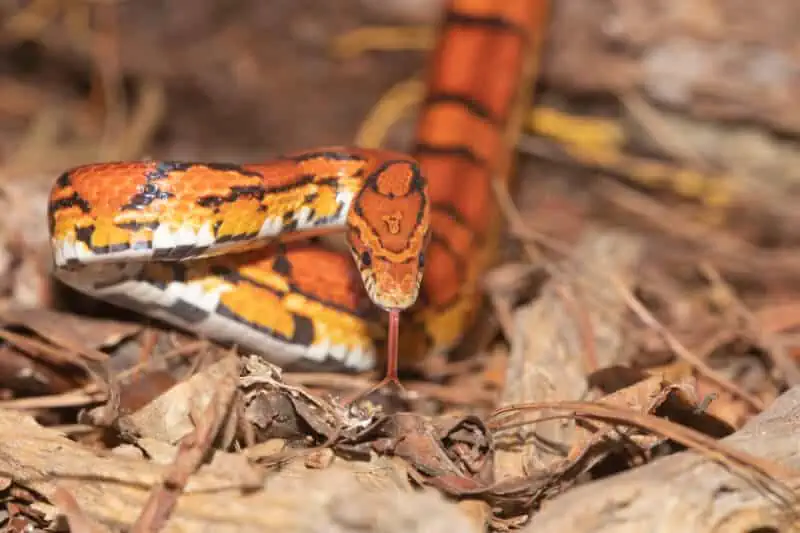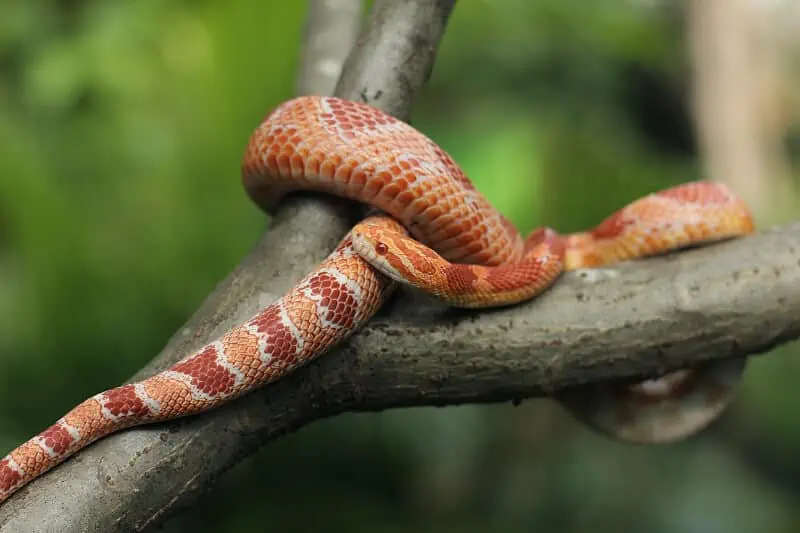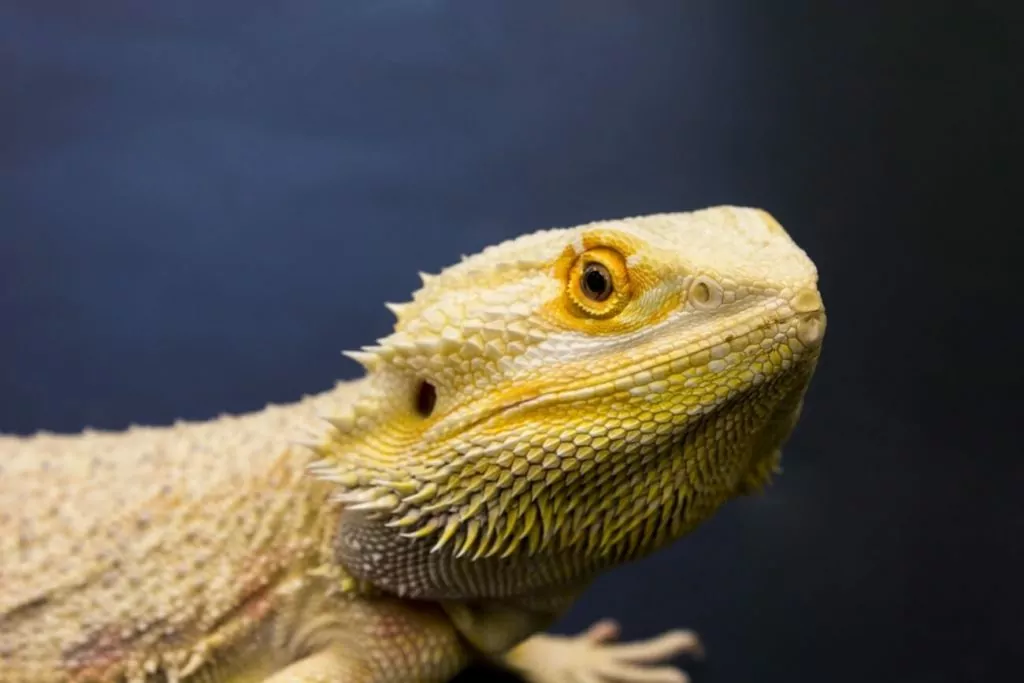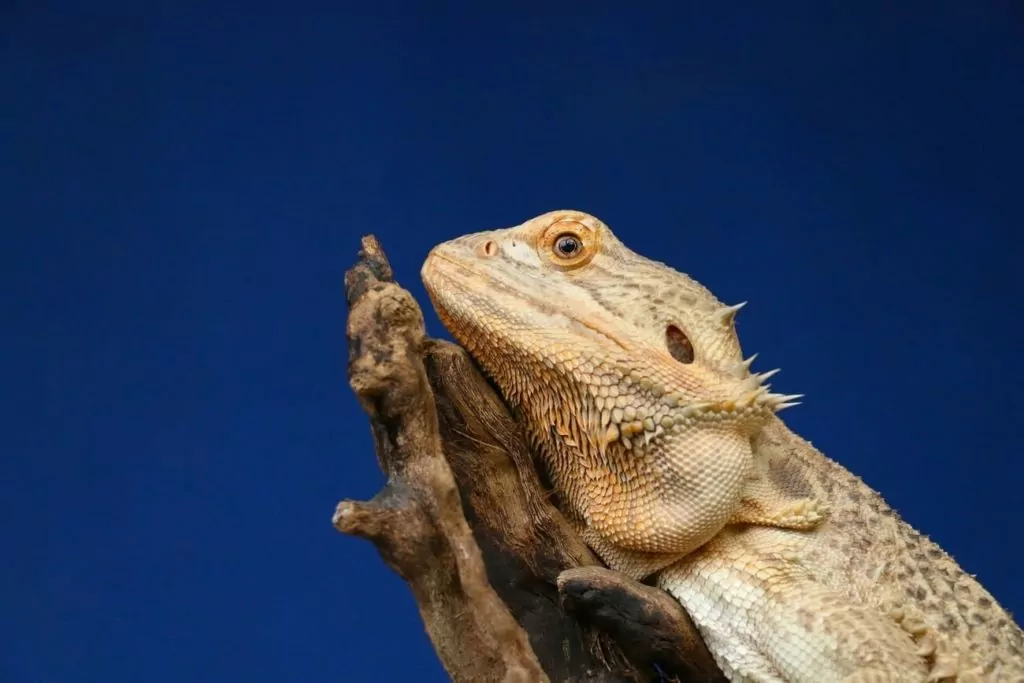Knowing how to deal with corn snake bites is an important skill to have as an owner. While not common, there are certain steps you’ll need to take in order to keep your pet safe.
This guide will cover if corn snakes bite, if bites hurt, their teeth situation, and much more!
Table of Contents
Do Corn Snakes Bite?
Corn snakes are one of the most popular snakes in the pet trade. They’re a beginner-friendly snake species known for being docile and friendly. These creatures also have vibrant coloration, making them sought-after pets for collectors.
Whether you’re considering owning one or already have a beautiful corn snake in your collection, you may wonder about the possibility of bites. Getting bit by a snake is a common fear for many, but what are the risks with corn snakes?
Corn snakes can bite you. However, bites are rare.
Like any other species, corn snakes are natural predators. They predominantly feed on mice and other small rodents. When they eat, they latch onto their prey, constrict the body, and swallow the animal whole!
Accidental bites can happen. Corn snakes have rather weak eyesight, so they can mistake your finger for a meal. Some may even feel the need to bite you as a form of defense if they’re stressed or feel like they’re in danger.

Luckily, those instances rarely occur. Bites are more common with wild specimens, but they’re few and far between with domesticated snakes. As long as you exercise caution and provide the reptile with everything it needs to stay healthy, you shouldn’t have to worry about bites like you would with a more aggressive species.
As mentioned earlier, corn snakes are easy-going and docile. While bites can happen, it’s usually not a significant concern for owners.
Are They Venomous?
Many species in the Serpentes order are venomous. Some of the most feared snakes are capable of taking down humans and large animals with a single bite! Paralysis-inducing neurotoxins can cause the body to shut down, leading to death without antivenin.
But don’t worry, corn snakes are not venomous. They don’t have venom-producing alveoli glands and lack the biological features to deliver toxins to their prey.
They’re the epitome of harmlessness, especially when you look at more hostile species like the king cobra or rattlesnake!
In the wild, corn snakes don’t need venom to catch prey. They’re constrictors, relying on their bodies to suffocate and kill the animals they eat. Venom plays no part in their survival, and they don’t have the biological makeup to produce it.
So even if you do get bit, you can breathe easy knowing that you don’t have to take a trip to the emergency room!
Do Corn Snake Bites Hurt?
Pain is subjective, but most owners would agree that corn snake bites are nothing to cry over. Many compare the feeling to a paper cut or a quick prick from a needle. It’s not a big deal for most people, and it’s certainly not an experience that will ruin your love of these snakes.
There are plenty of snake species out there that can deliver excruciating bites even without venom. Corn snakes are not one of them! They’re simply not built to produce those types of injuries (more on that in a bit).
These snakes are relatively small. They can grow to be several long, with some measuring almost six feet. But they’re also surprisingly thin and have small heads to match.
The biting force of a corn snake is mild. The reptiles don’t need the power to take down huge mammals. They get by on small rodents, and relatively light bites are more than enough to incapacitate their prey.
As a result, corn snake bites don’t hurt much at all. You may experience quick, sharp pain. The initial shock is often the worst part!
The sudden attack may even draw a little blood, but sometimes they don’t even do that. After the initial bite, there’s usually no pain beyond light tenderness afterward.
Do Corn Snakes Have Teeth Or Fangs?
Corn snakes do not have fangs.
Fangs are long teeth that some species have to inject venom or latch deep into their prey’s flesh. Corn snakes lack fangs but have many small teeth instead. The teeth are small and thin, resembling tiny fish bones.
The reason why corn snake bites don’t hurt is that the teeth are so small. You’re not getting pierced by two thick fangs. Instead, it’s a series of thin needle-like teeth that prick your skin.
In total, corn snakes have between 20 and 30 teeth. Most of them are on the top of the mouth. They group together to create four rows. Meanwhile, the bottom only has two rows of teeth.
The reptile’s teeth are sharp, but their arrangement and size aren’t suitable for tearing through human flesh or causing painful bites. They do well in incapacitating rodents and small prey animals but not enough to cause severe human injury.
That said, corn snake teeth do have one unique feature that can cause issues if you’re not careful. Instead of pointing straight down, the teeth angle backward. This serves a couple of purposes.
First, it helps keep prey animals within their grasp. As a rodent tries to wriggle away, the backward-facing teeth only sink deeper into its flesh to prevent escape.
Secondly, it helps them move food down their gullet. Snakes don’t chew their food like humans and most mammals. They swallow prey whole, and the arrangement of the teeth helps to guide those meals down the throat.
What Should You Do If A Corn Snake Bites You?
Corn snake bites are usually no big deal. They often happen accidentally when the reptile confuses your hand or finger for a meal. In most cases, they’ll deliver a quick bite before backing off.
So, how should you react?
Stay Calm
The most important thing to do is stay calm. There’s a good chance that your corn snake is feeling confused, excited, stressed, or even slightly aggressive when they bite you. Even if it was an accident, reactive negatively can exacerbate the problem and cause unnecessary stress to your pet.
It’s normal to be surprised by the bite, but don’t let that turn into a dramatic reaction. Avoid quick movements, hurling your corn snake away, or any other panicked behavior.
Be Gentle
It’s common for corn snakes to start constricting after a bite. It’s in their instincts, so you may see your snake begin to wrap around your arm.
Be gentle as you slowly unwrap your snake and move it back into its enclosure. Your priority should be to return the snake to its habitat safely and efficiently.
Give Your Snake Space
After a bite, leave your pet alone. Let them relax in the enclosure, and don’t try to force any handling. If you were cleaning the tank or feeding the snake when the bite occurred, hold off for a bit while your snake cools off.
Bites can be stressful for your corn snake, and your reaction can cause them to go into protection mode. Continuing to interact with them could lead to additional bites.
Take Care Of The Wound
Fortunately, corn snake bites don’t need much medical attention. The injury may draw some blood, but the injury is akin to a cat scratch or superficial paper cut.
Wash the wound with warm water and antibacterial soap. Follow up with antiseptic ointment and a bandage if necessary.
What If It Bites And Won’t Let Go?
Latching is one of the worst things that can happen when a pet corn snake bites you. Again, this is an instinctive response that snakes do when hunting prey. They latch onto their meals and begin constricting.
Sometimes, corn snakes will do the same when they bite humans.
Never pull a snake that latches onto you! It’s a natural reaction but it can turn an innocent bite into something worse.
When you pull, two things will happen. First, those backward-facing teeth will dig deeper into your skin. They may tear some of your skin as you pull the snake off, leading to a more severe injury.
Secondly, you could harm your corn snake. Any noticeable pressure as you pull will also cause stress that could cause the snake to latch harder.
So what do you do?
When a corn snake latches onto your skin, you need to encourage them to release. Some pet enthusiasts will try to pry the jaw open gently before lifting the snake off. However, that isn’t a method you should try until you have more experience handling corn snakes.
Instead of physically removing the snake, you can use water or alcohol.
Try dripping freezing water onto your corn snake’s head or the latched area. The sudden temperature change usually pulls attention and gets the snake to remove itself. The same goes for alcohol.
Apply high-percentage alcohol onto your skin where the snake is latching tightly. Don’t use rubbing alcohol. Spirits like vodka and whiskey work best.
How To Prevent Bites In The Future
Corn snake bites aren’t painful, but it’s wise to avoid them anyway. Avoiding bites will preserve the trust you build with your reptile and ensure that those experiences don’t cause unnecessary stress for your pet.
The best thing you can do to prevent bites is to be wary of why they occur.
Many corn snake bites occur because the animal is hungry. They must eat small mice every seven to 10 days based on age. If you stretch that timeline out, corn snakes can get antsy.
It’s also a good idea to avoid unnecessary handling in the days leading up to a feeding session. The snake will get hungry and may mistake your hand for prey. You should also avoid sticking your hand in the enclosure after feeding.
Another common bite scenario is agitation during shedding periods. Corn snakes shed regularly, and it can be a stressful situation. It uses up considerable energy and makes the snake vulnerable.
Avoid handling your snake as it sheds.
In addition to being mindful of when you interact with your corn snake, do what you can to make their enclosure as comfortable as possible. Maintain stable environmental conditions, provide many hiding spots, and clean the tank regularly.
A lackluster environment can cause corn snakes to feel stressed, resulting in more aggressive behaviors than usual.
Expert Tip: Also, avoid overhandling. These reptiles usually don’t mind handling once they establish trust. But like all animals, they have their limits! Excessive handling can lead to the snake lashing out.
Can A Baby Corn Snake Bite You?
Baby corn snakes can bite you, and are usually more aggressive than their mature counterparts. Hatchlings and juveniles don’t know any better, and they’re still learning about the world around them. As a result, young snakes tend to be more aggressive.
They become docile with age after they get used to your presence and learn to trust you.
The nice thing is that bites from baby corn snakes are even less painful than bites from adults. They often don’t even leave behind marks or injuries.
Can A Corn Snake Kill You?
Corn snakes cannot kill you directly. They’re far too small to do any real damage and aren’t venomous. These snakes are some of the most harmless you can find.
While they can bite, those moments are rare and don’t cause serious injury.
The worst-case scenario would be an infection from a bite. An infected wound of any kind could cause you serious harm. Luckily, you can avoid infection by adequately cleaning the bite wound and taking care of it until it heals.
Conclusion
Corn snake bites aren’t anything to worry about. They don’t hurt very much and aren’t dangerous at all (as long as you clean up the wound afterwards).
But knowing how to deal with the bite in the moment is vital in order to prevent your pet from getting hurt. As long as you stay calm and follow our steps, everyone will be just fine!



